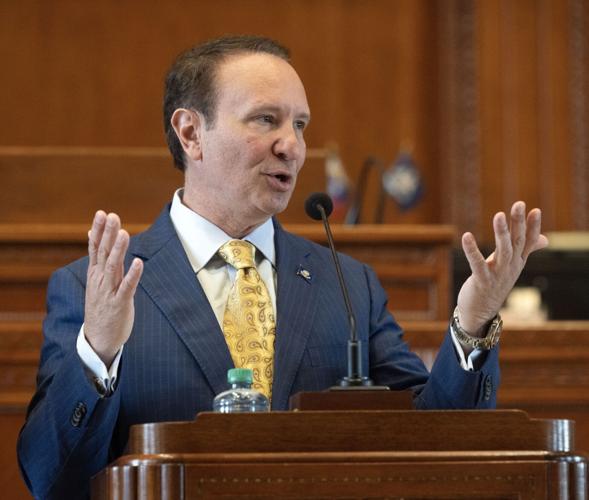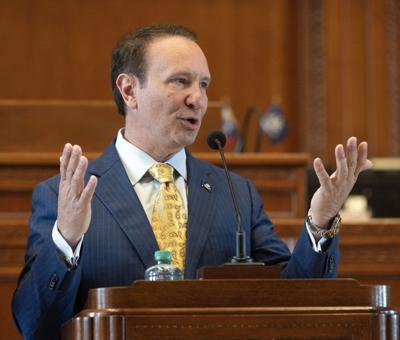Every new governor takes office promising change. Yet, even as Louisiana’s political pendulum has swung back and forth, from right to left and back again for generations, not much has changed.
Louisiana still trails other Southern states in just about every way measurable — from literacy rates to infant birth weights, from student test scores to cancer rates, from gun and domestic violence rates to population growth, and from poverty rates to obesity. The list of low “quality of life” scores goes on and on.
Gov. Jeff Landry, like all of his predecessors, promises change — but little of his legislative agenda addresses the societal ills listed in the preceding paragraph.
Rather, Landry has embarked on a hard-right push that includes more attacks on human and civil rights, less government help for those struggling at the bottom, expanding the state’s already-generous corporate welfare programs, further privatizing public education, and removing as many layers of consumer protection as possible.
He also wants to rewrite Louisiana’s “bloated, outdated, antiquated, and much-abused” constitution, though he hasn’t specified how that would happen or who would do the rewriting. Landry’s overall goal, however, is one that many reformers have touted — removing fiscal minutiae from the state’s charter and freeing lawmakers (and governors) to set budgetary priorities to meet evolving challenges.
The last governor to push for a new constitution was Edwin Edwards, who campaigned on that issue in 1971. Landry did not mention a constitutional rewrite during his campaign last year.
Writing a new constitution is a tall order, even for a governor with a legislative supermajority. The current constitution, which voters approved in 1974, contains a host of provisions put there by special interests, including sheriffs, district attorneys and others who were key to Landry’s election. It will be interesting to see what comes of his pitch for a rewrite.
Elsewhere, the governor said his priorities in the legislative session that began March 11 are education, the economy and insurance reform.

Secretary of State Nancy Landry
While Landry will be the dominant force during the session, he won’t be the only big player.
New Insurance Commissioner Tim Temple is backing a slate of bills that favor insurance companies, and new Secretary of State Nancy Landry supports an “election integrity package.”
Lawmakers also will consider bills that affect the medical community and health care, coastal restoration, local governance — particularly for New Orleans and the Sewerage and Water Board (S&WB) — and Supreme Court reapportionment.
Those are just the toplines. Lawmakers have introduced more than 1,000 bills. Many are duplicative, and most will fail by the time the 85-day “regular” session reaches its mandatory end date on June 3.
Between now and then, here’s a look at some of the proposals that will make headlines.
Education
Landry and conservatives will unite behind a proposal to authorize “education savings accounts,” or ESAs, which actually have nothing to do with “savings.” They’re actually the new buzzword for vouchers.
“Put parents back in control, and let the money follow the child,” Landry told lawmakers in his opening-day speech.
Translation: Get ready for a tsunami of pop-up faith-based schools that seek to tap public funds at the expense of public schools.
Landry also called for schools to be “free from the dangers of uncontrolled classrooms, free from bureaucracy that prioritizes petty grievances above children in the classroom, and free from being indoctrinated by the latest radical social cause.”
Translation: No more “diversity, equity and inclusion” or DEI; no more talk of slavery and its legacy of discrimination (only whitewashed, “feel good” history); and nothing that welcomes LGBTQ students or their parents.

Louisiana Commissioner of Insurance Tim Temple
Insurance
Insurance Commissioner Temple supports a package of bills that insurance companies will love.
One of the most controversial is a proposal to eliminate Louisiana’s unique “three-year rule.” The rule bans insurers from dropping customers if they have been with the insurer for three years and paid premiums on time. Former Commissioner Jim Donelon is a big promoter of the rule. Temple says it drives insurers away.
Temple also backs measures that will overhaul how claims are handled by setting new deadlines for when insurers must pay claims, provide new definitions for key terms in the claims process and limit how and when policyholders can sue their insurers. These proposals will draw fire from trial lawyers, many of whom backed Landry. So far, the governor has steered clear of this fight.
Economic Development
Landry and new Louisiana Economic Development (LED) chief Susan Bourgeois have been working with the private nonprofit Committee of 100, whose members include the state’s top business and higher education CEOs, to draft legislation that will overhaul how the state attracts investment and creates jobs.
State Sen. Beth Mizell, R-Franklinton, has said she will introduce a bill to implement the changes sought by Bourgeois. The deadline for filing bills is April 2.
Overall, Landry’s approach will be more generous tax breaks for new and expanding businesses and industries, removing as many regulations as possible, and implementing a long-range plan that continues from one administration to the next rather than changing with each new governor.
“We must act now to create a business-friendly atmosphere at this pivotal moment in history,” Landry said in his opening remarks on March 11.
One specific change Landry mentioned is adopting “universally recognized occupational licensures.” He said Louisiana ranks among the most burdensome states for occupational licensing.
Gov. Jeff Landry's first two months as Louisiana's governor have been nonstop.
New Orleans Issues
Landry has targeted S&WB for special treatment by naming a task force to come up with ways to improve the much-maligned agency, which was created by state legislation more than a century ago.
Potential “fixes” include ideas that will require legislative approval, such as changing the board’s makeup and leadership (the mayor chairs the board under current law), separating water and sewerage from drainage responsibilities, and providing more direct state oversight of S&WB billing and operations.
The city also will be looking for millions more from the state to complete a new electric substation to replace the S&WB’s antiquated generator.
In the wake of the governor’s special session on crime, city officials and hospitality leaders are hoping lawmakers will amend the recently adopted “constitutional carry” law that allows anyone 18 or older to carry a concealed handgun without a permit and without training. Their aim is to bar concealed handguns in the French Quarter — except for those with a valid state permit, which requires training.
Another hot topic in New Orleans is finding ways to rein in the “Krewe of Chad” — folks who block off public spaces for private enjoyment during Mardi Gras. A state Senate committee has already blessed Senate Bill 339 by state Sen. Jimmy Harris, D-New Orleans, to impose a minimum fine of $2,500 for blocking streetcar lines “before or after a public event” (read: Mardi Gras parade).

Rep. Julie Emerson, R-Carencro
Other Hot Topics
Landry hoped to convince lawmakers to ditch the state’s popular “jungle” or “open” primary elections system in favor of “closed” party primaries during his first special session, but they instead passed a significantly watered-down measure. The new law requires political parties to allow more than 600,000 unaligned or “no party” voters in Louisiana to cast ballots in any party primary or runoff, and it applies only to elections to U.S. House and Senate, the state Supreme Court, the Board of Elementary and Secondary Education (BESE), and the Louisiana Public Service Commission.
The governor apparently hasn’t given up on closed primaries, however.
State Rep. Julie Emerson, R-Carencro, filed a measure to make all statewide, legislative, Supreme Court and non-local offices subject to party primaries. As originally filed, Emerson’s bill keeps the provision in the new law allowing “no party” voters to cast ballots in party primaries and runoffs. It will be worth watching to see if Emerson’s bill stays that way.
Elsewhere on the elections front, Secretary of State Nancy Landry (no relation to the governor) wants lawmakers to pass bills that expand the annual voter canvass, prohibit individuals from assisting with more than one absentee ballot (except for immediate family members), ban ranked-choice voting, create a Division of Election Integrity in her office, and require those who conduct voter registration drives to register with her office so that voters’ personal information is protected and new registrations are submitted on time.

Sen. Alan Seabaugh, R-Many
In a move that signals lawmakers’ continued interest in “tough on crime” legislation, Senate Bill 24 by state Sen. Alan Seabaugh, R-Shreveport, would repeal a law enacted two years ago that limits law enforcement’s release of mugshots.
Sen. Royce Duplessis, D-New Orleans, authored the 2022 law, which he says protects innocent persons from having their reputations permanently harmed by booking photos that go public immediately. Current law also prohibits for-profit websites from making innocent people pay to have their mugshots removed. Seabaugh’s bill repeals the current law entirely, though he says he’s open to a provision dealing with the websites.
One of the few defeats dealt to Landry in both special sessions was his attempt to redistrict the Louisiana Supreme Court. He hasn’t given up on that, either.
Three Supreme Court redistricting bills cleared committee in the first days of the current session and are set to be considered by the full Senate on March 20. All three would create a second majority-Black district, but they vary significantly in how that goal is achieved.
Landry and others say creating a second majority-Black district would help resolve a pending federal lawsuit challenging the current Supreme Court districts.
No part of the Republican Party’s agenda can be ruled out anymore.
Republicans in the state House and Senate have introduced a host of bills in the annual session that would have been considered fringe policies even a few years ago.












